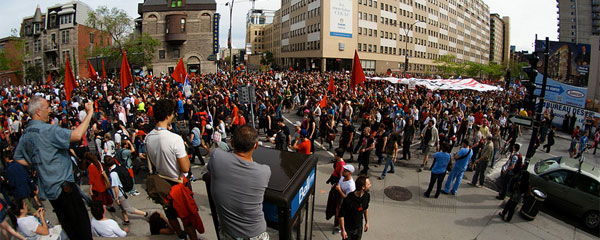Québec's Student Strike: La Lutte Continue, but What Lessons Can We Learn?

Hundreds of thousands of students march in Montréal on May 22. Photo courtesy fatseth via Flickr.
Striking university students in Québec are well into their 15th week of continuous protests. Their strike, which began primarily in opposition to student debt and the proposed 75% tuition hike, has since expanded to encompass wider critiques of both the university system itself and larger issues of austerity and neoliberal economic reform.
Québec’s hardline conservative premier, Jean Charest, several days ago pushed through a series of draconian anti-free-speech laws aimed at breaking the strike. Penalties run in the tens of thousands of dollars and up to 10 years in jail for those participating in or even promoting unpermitted protest actions; and even for protest marches that have been approved by the police, the sponsoring organization will be held liable for any and all illegal actions taken at or near the march.
In a surprise to absolutely no one but Charest, these laws have not only rekindled student participation in the strike, but sparked an even greater outrage among the general population. This past Tuesday -- the hundredth day of the strike -- an astounding number of students and allies marched in Montreal. Estimates range from 300,000 to 500,000 participants, a historic number even for Québec’s activist past. Opinion polls similarly showed a huge 18 point increase in support for students and opposition to the government.
Coop média de Montréal has an excellent run-down of Ten Points Everyone Should Know About the Quebec Student Movement, which gives the best primer I’ve yet seen on what exactly is happening -- and why. You really need to go read that now. I’ll wait.
...Done? Great! Point #3, “The student strike was organized through democratic means and with democratic aims,” is something I’d like to develop a bit further here because it’s a crucial lesson our neighbors to the north have to teach us.
Student unions exist in almost every industrialized nation in the world (except for the United States, whose students are stuck with poor imitations usually called “student governments”), and they are charged with defending and advancing student interests, both on- and off-campus. Most of Québec’s student unions are very different from student unions in the rest of Anglophone Canada: they’re directly democratic, in a way anyone familiar with Occupy Wall Street will immediately recognize:
Among the Francophone schools in Quebec, the leaders are not only elected by the students, but decisions are made through general assemblies, debate and discussion, and through the votes of the actual constituents, the members of the student associations, not just the leaders.
This use of direct, deliberative democracy is a key reason why Québécois student strikes are without exception larger, last longer, and are more successful than those elsewhere in Canada. Because strike resolutions (which happen on every university campus, and in individual academic departments as well for larger schools) can only be passed when a majority of students approve:
- Strikes rarely happen without considerable student support;
- Students feel more personally invested in the success of the strike; and
- Strikes hold more legitimacy in the eyes of the officials and the greater public than protests organized by a small group.
But separate from that, and possibly more important, is the transformative and prefigurativenature of the democratic process. Genuine, grassroots, participatory democracy is uniquely potent in wiping away the patina of legitimacy that coats elected politicians and the injunctions they decree. Student assemblies are held every week, and on some campuses every night, to determine local activities and often to decide whether to continue the strike. Many have moved even further than the official demands of the strike and are calling for a more democratically-run university (a truly dangerous demand for those in power).
There are relatively few Anglophone universities in Québec, and for the most part students have more culturally and socially in common with their counterparts in other provinces than the schools down the street from them. However, for the first time in history, the Anglophone student associations at Concordia and McGill have joined the strike, an act arriving on the heels of their recent adoption of democratic decision-making structures (instead of solely elected representatives).
The strike has also spread past what we in the U.S. would think of as the university. Québec’s education system has a third institution between high school and university -- the CEGEP, which is a two-year school combining our senior year of high school and our college freshman year. Most CEGEPs and high schools also have student unions, and many of the strike’s most dedicated and energetic organizers come from their ranks. Student organizing in Québec offers lessons for American students in every grade.
In the face of increasingly brutal and authoritarian suppression on the part of the government -- to the point of one leading official explicitly endorsing fascist tactics from the 1920s and ‘30s to harm his fellow citizens -- this Québécois model of student unionism is more important than ever. These hundreds of tiny bastions of direct democracy, like so many seeds strewn on a field, may just yet blossom into a freer, more just, and more democratic Canada. And no matter the outcome of this particular strike, I hope this example inspires us to pick up our own watering cans and start growing democracy here in the United States -- a land not unfamiliar with that particular crop.